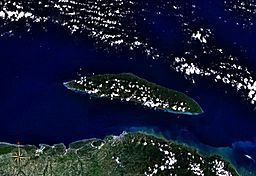Tortuga (Haiti) facts for kids
Quick facts for kids Tortuga Island (Île de la Tortue) |
|
| (Kréyol: Il Latòti) | |
| Island | |
|
Tortuga seen from space
|
|
| Name origin: Tortuga, Spanish for turtle | |
| Country | Haiti |
|---|---|
| Département | Nord-Ouest |
| Arrondissement | Port-de-Paix |
| Commune | Île de la Tortue |
| Highest point | Morne La Visite |
| - elevation | 340 m (1,115 ft) |
| Length | 37 km (23 mi) |
| Width | 7 km (4 mi) |
| Area | 193 km² (75 sq mi) |
| Population | 30,000 (2004) |
| Discovered | 1492 |
| - Settled | 1625 |
| Timezone | EST (UTC-5) |
| - summer (DST) | DST (UTC-4) |
Île de la Tortue (which means Tortuga Island in English) is a Caribbean island. It is part of Haiti, located off the northwest coast of Hispaniola. The island's original Taíno name was Baynei.
In the 17th century, Tortuga Island was a very important place for piracy in the Caribbean. Pirates would trade their stolen goods here. They would also stay on the island for days before heading out to capture more ships.
Contents
Exploring Tortuga Island's Geography
Tortuga Island is considered the western end of the Cordillera Septentrional (Northern mountain range) of Hispaniola. Even though it's part of the same geological area, it is separated from the main island.
How Far is Tortuga Island from Haiti?
A strait called the Canal de la Tortue (La Tortue Channel) separates Tortuga Island from Haiti's north coast. This channel is about 8.9 to 15 km wide.
What is the Size of Tortuga Island?
The island is about 37.5 km long and 7 km wide. Its total area is 193 km². While there are no very high mountains, most of the land is between 240 and 300 metres high. The highest point on the island is Morne La Visite, which is 340 meters tall.
How is Tortuga Island Governed?
Tortuga Island is a commune, which is like a municipality or local government area. It is part of the Port-de-Paix arrondissement, which is a larger administrative area. This arrondissement is then part of the Nord Department, similar to a district or province.
People Living on Tortuga Island
In 2004, about 30,000 people lived on Tortuga Island. There are only small towns on the island. Aux Palmistes, located in the southeast, is the largest town.
The History of Tortuga Island
Christopher Columbus first saw Tortuga Island on December 6, 1492. He visited it on December 14. He named the island La Tortuga, which means "The Turtle" in Spanish. He gave it this name because the island looked like a turtle from the sea.
Why Was Tortuga Island Not Settled by Spain?
The Spanish people were not very interested in Tortuga Island. They were focused on building a large colony on the bigger island of Hispaniola. Because of this, Tortuga Island remained mostly empty for most of the 16th century.
How Did Europeans Settle Tortuga Island?
People from different European countries, especially from England, began to live on Tortuga Island. In 1625, French people arrived from the Saint Kitts island. They settled on the southern part of Tortuga, where the land was flat. They tried to grow crops like tobacco.
These settlers also went to Hispaniola, which they called la Grande Terre ("the Big Land"). There, they would hunt wild cows and pigs. They used a Taíno cooking method with smoke, known as "boucan." Because of this, they became known as boucaniers (or "buccaneers"). They sold the smoked meat and leather (dry skin used for footwear and clothing) to ships that came to the island.
The Spanish Attempts to Reclaim Tortuga
The Spanish tried many times to remove these settlers from Tortuga Island. They invaded the island several times. However, each time they left to return to Hispaniola, the island was quickly taken over again by the settlers.
In 1640, a French engineer named Jean La Vasseur was sent to govern Tortuga. He built a fort called Fort de Rocher in 1640. La Vasseur allowed outlaws from all nations to use the port.
Why Did Tortuga Island Lose Importance?
From Tortuga Island, people started moving to the northern part of Hispaniola. They settled in areas with large plains. They founded towns like Port-de-Paix (in 1665), Cap-Français (in 1670), and Fort-Dauphin (in 1731). After these towns were established, Tortuga Island became less important. Very few people have lived there since then, even today.
Things to See and Do on Tortuga Island
Tortuga Island has several beautiful beaches. Point Saline, located at the western tip of the island, is often considered the best beach.
Historical Sites on Tortuga Island
At Basse-Terre, on the southeastern coast, you can still find some remains of the Fort de la Roche. This fort was built by the French in 1630.
Exploring Caves on Tortuga Island
There are also several interesting caves to explore on the island. Some of these include La Grotte au Bassin and La Grotte de la Galerie.
Images for kids
See also
 In Spanish: Isla de la Tortuga (Haití) para niños
In Spanish: Isla de la Tortuga (Haití) para niños
 | Bayard Rustin |
 | Jeannette Carter |
 | Jeremiah A. Brown |



